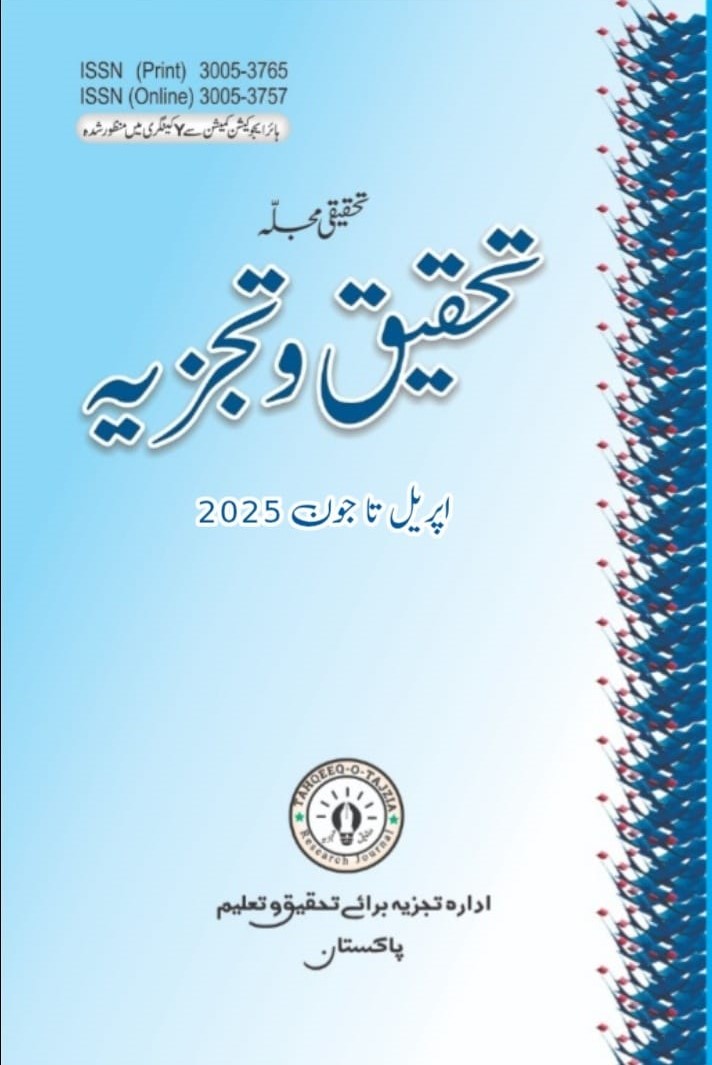The Poem " Inqilab Ae Inqilab ": An Explanatory Study of Intellectual, Revolutionary and Spiritual Aspects
Keywords:
: Inqilab Ae Inqilab, Urdu poetry, Revolution, Spiritual Awakening, Intellectual analysis, Moral TransformationAbstract
The poem “Inqilab Ae Inqilab” is a powerful depiction of intellectual, revolutionary, and spiritual dimensions in Urdu poetry. This explanatory study explores how the poet redefines revolution not merely as a political or social upheaval but as a deep inner awakening essential for human dignity and societal progress. The poem’s verses inspire courage, justice, and truth, urging individuals to rise against oppression with spiritual strength and moral clarity. The poet envisions a society based on ethical values where inner purification leads to outer change, creating harmony between self-reform and collective transformation. Through vivid imagery and impactful metaphors, the poet evokes the necessity of fearlessness, sacrifice, and wisdom to bring about holistic change. This research highlights the philosophical message that true revolution begins within, reshaping thoughts and character before reconstructing systems and structures. Thus, “Inqilab Ae Inqilab” emerges as a timeless call for intellectual, spiritual, and social revival, inspiring readers to become agents of meaningful change in an era marred by moral decay and injustice.
References:
- Iqbal, Allama. Kulliyat-e-Iqbal (Urdu). Islamabad: National Book Foundation, 2016, p. 214.
- Ibid, p. 243.
- Malik, Fateh. .. Fikr o Amal. Lahore: Sang-e-Meel Publications, 2009, p. 26.
- Ghani, Abdul. Allama Iqbal ki Farsi Nazm Goi. Lahore: Bazm-e-Iqbal, 2 Club Road, January 2000, p. 153.
- Ehsan, Abdul Shakoor. Iqbal ki Farsi Shayari ka Tanqeedi Jaiza. 2nd ed. Lahore: Iqbal Academy Pakistan, 2000, p. 124.
- Iqbal, Allama. Kulliyat-e-Iqbal (Farsi). Lahore: Sheikh Ghulam Ali and Sons, n.d., p. 486.
- Iqbal, Allama. Kulliyat-e-Iqbal (Urdu), p. 423.
- Malik, Fateh. Fitna Inkar-e-Pakistan. Lahore: Sang-e-Meel Publications, 2008, p. 58.
- Fatima, Kaneez. Iqbal aur Asri Masail. Lahore: Sang-e-Meel Publications, 2005, p. 375.
- Iqbal, Allama. Kulliyat-e-Iqbal (Farsi), p. 487.
- Iqbal, Allama. Kulliyat-e-Iqbal (Urdu), p. 424.
- Ibid, p. 234.
- Malik, Fateh Muhammad. Iqbal ke Siyasi Tasawwur. Islamabad: Dost Publications, 2013, p. 31.
- Iqbal, Allama. Kulliyat-e-Iqbal (Urdu), p. 324.
- Iqbal, Allama. Kulliyat-e-Iqbal (Farsi), p. 487.
- Zaidi, Shiraz Ali. Samrajiyat par Iqbal ki Tanqeed. Karachi: Saeed Publications, n.d., p. 46.
- Sharwani, Lateef Ahmad, ed. Harf-e-Iqbal. Islamabad: Allama Iqbal Open University, 1987, p. 38.
Bibliography:
Ehsan, Abdul Shakoor. Iqbal ki Farsi Shayari ka Tanqeedi Jaiza. 2nd ed. Lahore: Iqbal Academy Pakistan, 2000.
Fatima, Kaneez. Iqbal aur Asri Masail. Lahore: Sang-e-Meel Publications, 2005.
Ghani, Abdul. Allama Iqbal ki Farsi Nazm Goi. Lahore: Bazm-e-Iqbal, 2 Club Road, January 2000.
Iqbal, Allama. Kulliyat-e-Iqbal (Farsi). Lahore: Sheikh Ghulam Ali and Sons, n.d.
Iqbal, Allama. Kulliyat-e-Iqbal (Urdu). Islamabad: National Book Foundation, 2016.
Malik, Fateh. Fitna Inkar-e-Pakistan. Lahore: Sang-e-Meel Publications, 2008.
Malik, Fateh. Iqbal... Fikr o Amal. Lahore: Sang-e-Meel Publications, 2009.
Malik, Fateh Muhammad. Iqbal ke Siyasi Tasawwur. Islamabad: Dost Publications, 2013.
Sharwani, Lateef Ahmad, ed. Harf-e-Iqbal. Islamabad: Allama Iqbal Open University, 1987.
Zaidi, Shiraz Ali. Samrajiyat par Iqbal ki Tanqeed. Karachi: Saeed Publications, n.d.
Downloads





